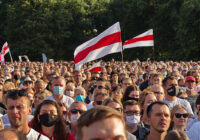The rigged election of President Alexander Lukashenko of Belarus has provoked massive protests among the citizenry. The uprising appears to have radically destabilized the authority of Lukashenko’s government. The New York Times offers this assessment: “Mr. Lukashenko’s security apparatus showing no sign of wavering in its support for his government, the president may survive the current storm. But he has lost the aura of an invincible popular leader.”
Here is today’s 3D definition:
Invincible:
A quality that includes the idea of untouchable, invulnerable, immune and applied for long periods of time to despots, powerful oligarchs, blackmailers and more generally the very rich, who while theoretically accountable before the law can afford legal teams capable of parrying all threats
Contextual Note
The case of Belarus stands out in an international landscape at a moment of history in which the populations of many nations are now prone to protest every government’s handling of the COVID-19 pandemic. The Times describes Lukashenko as “fighting for his political life, besieged by protests across his country and a tsunami of international criticism.”
Can China Duplicate the US Military-Industrial Complex?
No leader is truly invincible. But no recognized means exist for wresting power from a leader who controls the military, especially in a nation such as Belarus whose population has never had any serious expectations of democratic elections being anything more than a public ritual to confirm the existing power structure.
Anna Romandash, writing for Fair Observer, described the depth of a crisis that goes far deeper than protests over election results or the government’s handling of the COVID-19 pandemic. “However, the events leading up to the election demonstrated that some big changes were taking place in Belarus,” Romandash writes. The Ukrainian journalist adds that “the level of popular dissatisfaction has reached its all-time high, with people becoming increasingly disillusioned with the regime and its handling of the many crises facing Belarus.”
The author’s pessimistic conclusion that “with the resources at his disposal, Lukashenko can remain in power unless both domestic and external pressure are applied equally strongly and consistently” is sadly but undoubtedly true. In particular, it is difficult to imagine what kind of external pressure — from the West, Russia or both combined — might unseat Lukashenko.
In more ways than one, this illustrates the dilemma facing almost all nations across the globe, one brought into focus by the pandemic. The presence of an unprecedented, uncontrollable threat to public health has highlighted other often more local contradictions the populations of many nations are faced with. The frustration with increasing levels of economic and sanitary uncertainty has provoked multiple reactions among those who feel themselves the victims of forces that appear devoid of accountability. This inevitably leads to the discrediting and destabilizing of all forms of existing authority.
In some places — the US, France, the UK, for example — the deeper issue may be racial inequality and police brutality. In many nations across the globe, the growing inequality of wealth and income associated with the manifest arrogance of the ruling classes on every continent may be close to reaching a breaking point. In other places, it may be the visibly growing threat to the climate itself provoking ever-increasing numbers of natural disasters in many regions.
This year has proved special. With all the other trends augmenting the tensions within national borders, the local mishandling of a global pandemic by so many different governments represents the straw that is breaking multiple camels’ backs.
The reasons not just for contesting authority but for professing a deep lack of belief in its pretension to govern have been present for some time. The yellow vest movement in France, whose effects have not been erased though circumstances have halted its dynamics, represents one obvious indicator. Four years of deep political uncertainty in the UK over Brexit is another. And Donald Trump’s imposed cultural chaos is yet another.
The global crisis is real and profound because it entails a growing disaffection with the ideals associated with democracy and representation. Disorder will only grow, which means that the response to disorder will become more and more violent, as we are seeing today. Thanks to technology and massive investment in military equipment, governments have the means to repress practically any amount of uprising. But at some point, they run the risk of discovering the populations they supposedly govern are themselves ungovernable. What that tipping point will look like nobody knows.
In Belarus, the BBC reports that “the level of brutality is shocking and new. Protesters and often passers-by have been targeted by people clad in black, wearing balaclavas and with no insignia or uniform.” These are the same tactics President Trump deployed in Portland to control peaceful demonstrations. Short of the utter collapse of the global economy, this may indicate what much of urban life will be like in the next few years.
Historical Note
The Guardian points to the historical specificity of Belarus among the nations of Eastern Europe formerly controlled by the Soviet Union. The British journal describes Belarus’ system of government as an “idiosyncratic form of autocracy” and alludes to the very real “vulnerability of Lukashenko’s hold over a country seen by neighbouring Russia as a strategic buffer against Nato and the European Union.”
Predictably, Russia supported Alexander Lukashenko’s claim that the protests are due to foreign meddling. But Russia’s support of an ally in the resistance to European incursion may be far from absolute. According to The Moscow Times, Russian President Vladimir Putin confirmed his commitment to “retaining a stable domestic political situation in Belarus.”
Russian readers will have to decide whether “stable” means defending the existing regime or seeking an original political solution to a problem that has become seriously unstable. Russian news outlets have reported on the clashes but mostly avoided showing sympathy for one side or the other.
This contrasts with the attitude expressed by Komsomolskaya Pravda. The pro-Kremlin tabloid recognized that the official election results reflected probable fraud. It went further, accusing Lukashenko of insulting the people. And far from comforting the president’s right to hold onto power, it acknowledged his vulnerability. “The president of Belarus, guarding his ‘80%’ with bayonets, will face difficulties. He has to find a way to explain what happened on Aug. 9,” the Russian newspaper reports.
The Wall Street Journal wasted no time by directly accusing Putin of seizing “an opportunity to reestablish [Russia’s] influence in Belarus by shoring up Mr. Lukashenko after an unprecedented wave of protests following Sunday’s vote.” This is undoubtedly true, but the historical context is far from simple. In the very recent past, as Mitch Prothero explains in an article for Business Insider, Lukashenko has demonstrated an attitude of defiance with regard to Russia. He accused Putin of interfering in the elections and even of sending 33 mercenaries to Minsk, who were arrested only days before the vote.
Prothero explains that “Lukashenko’s long-standing ability to play the European Union to its west and Russia to its east off one another to bring in international assistance has increasingly irritated Putin.” Contradicting The Wall Street Journal, which wants its readers to believe it has a hotline to Putin’s mind, Porthero quotes these thoughts of a NATO official: “It’s not a great situation in general but doubly dangerous because nobody can say for sure what Putin will do.” The official added this pertinent remark: “This is a normal crisis for a dictator like him. What’s unusual is Russia’s confused position.”
In many ways, this typifies the problem the West has with Eastern Europe, whether the bone of contention is Ukraine, Crimea, Belarus or even the nations such as Hungary and Slovakia that are now part of the European Union. Westerners simply lack the psychological insight required to understand the complex experience and worldview of the people who formerly lived under governments that were part of the Soviet bloc.
Even in the absence of the political and ideological conditions that defined the Cold War, the West insists on maintaining what amounts to a cold war reading of history. It wants everything to be reduced to a simple choice between good and evil, freedom and authoritarian control, the supposed ideals of the capitalist West and the cynicism of the authoritarian (even if no longer communist) East. But even the authority of that hitherto comfortable and well-defended ideological position has now become destabilized.
*[In the age of Oscar Wilde and Mark Twain, another American wit, the journalist Ambrose Bierce, produced a series of satirical definitions of commonly used terms, throwing light on their hidden meanings in real discourse. Bierce eventually collected and published them as a book, The Devil’s Dictionary, in 1911. We have shamelessly appropriated his title in the interest of continuing his wholesome pedagogical effort to enlighten generations of readers of the news. Read more of The Daily Devil’s Dictionary on Fair Observer.]
The views expressed in this article are the author’s own and do not necessarily reflect Fair Observer’s editorial policy.
Support Fair Observer
We rely on your support for our independence, diversity and quality.
For more than 10 years, Fair Observer has been free, fair and independent. No billionaire owns us, no advertisers control us. We are a reader-supported nonprofit. Unlike many other publications, we keep our content free for readers regardless of where they live or whether they can afford to pay. We have no paywalls and no ads.
In the post-truth era of fake news, echo chambers and filter bubbles, we publish a plurality of perspectives from around the world. Anyone can publish with us, but everyone goes through a rigorous editorial process. So, you get fact-checked, well-reasoned content instead of noise.
We publish 3,000+ voices from 90+ countries. We also conduct education and training programs
on subjects ranging from digital media and journalism to writing and critical thinking. This
doesn’t come cheap. Servers, editors, trainers and web developers cost
money.
Please consider supporting us on a regular basis as a recurring donor or a
sustaining member.
Will you support FO’s journalism?
We rely on your support for our independence, diversity and quality.








Commenting Guidelines
Please read our commenting guidelines before commenting.
1. Be Respectful: Please be polite to the author. Avoid hostility. The whole point of Fair Observer is openness to different perspectives from perspectives from around the world.
2. Comment Thoughtfully: Please be relevant and constructive. We do not allow personal attacks, disinformation or trolling. We will remove hate speech or incitement.
3. Contribute Usefully: Add something of value — a point of view, an argument, a personal experience or a relevant link if you are citing statistics and key facts.
Please agree to the guidelines before proceeding.